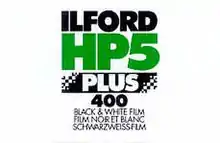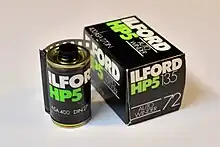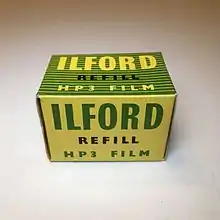Ilford HP
HP is a cubic-grain black-and-white film from Ilford Photo with a long history.[2] It originated as Hypersensitive Panchromatic plates in 1931. Since then it has progressed through a number of versions, with HP5 plus (HP5+ for short) being the latest. The main competitor of Ilford HP5 Plus is Kodak Tri-X 400.
| HP5 plus | |
|---|---|
 | |
| Maker | Ilford Photo |
| Speed | 400/27°[1] |
| Push | 3200/36° |
| Type | B&W print |
| Process | Gelatin-silver |
| Format | 35mm, 120, sheets, disposable camera |
| Application | General |
| Introduced | 1989 |
| HP5 | |
|---|---|
 | |
| Speed | 400/27° |
| Type | B&W |
| Introduced | 1976 |
| Discontinued | 1989 |
| Replaced by | HP5 plus |
| HP4 | |
|---|---|
| Speed | 400/27° |
| Type | B&W |
| Introduced | 1965 |
| Discontinued | 1976 |
| Replaced by | HP5 |
| HPS | |
|---|---|
| Speed | 400/27°, 800/30° (1960) |
| Type | B&W |
| Grain | coarse |
| Introduced | 1954 |
| Discontinued | 1998 |
| Replaced by | Delta 3200 |
| HP3 | |
|---|---|
 | |
| Speed | 125/22°, 200/24° (1952–53), 400/27° (1960) |
| Type | B&W |
| Introduced | 1941 |
| Discontinued | 1969 |
| Replaced by | HP4 |
| HP2 | |
|---|---|
| Speed | 200/24° |
| Type | B&W |
| Introduced | 1939 |
| Discontinued | 1941 |
| Replaced by | HP3 |
| HP | |
|---|---|
| Speed | 160/23° |
| Type | B&W |
| Introduced | 1935 |
| Discontinued | 1939 |
| Replaced by | HP2 |
HP3 went through two speed changes in its history, but only one actual change to the emulsion. In 1960 the 200 ISO/ASA emulsion was relabeled as 400 ISO/ASA with no change to the product. The 200 ISO/ASA speed included an exposure safety margin, but with improvements in light meters this was deemed unnecessary, thus the speed was revised up to 400 ISO/ASA.
On September 23, 2005, Ilford reintroduced its black-and-white single-use camera which includes 27 exposures of HP5 plus film.[3]
References
- https://www.ilfordphoto.com/amfile/file/download/file/1903/product/694/
- "Ilford History and Chronology". Retrieved 2008-07-27.
- "BLACK AND WHITE MADE EASY" (Press release). Ilford Photo. 2005-09-23. Archived from the original on 2012-02-06. Retrieved 2007-03-20.